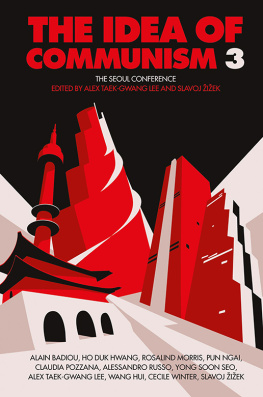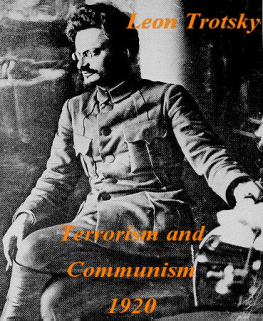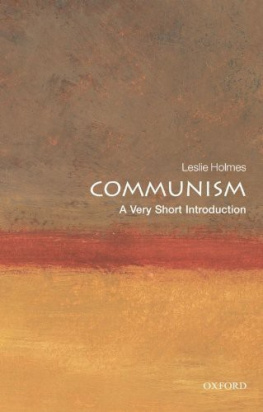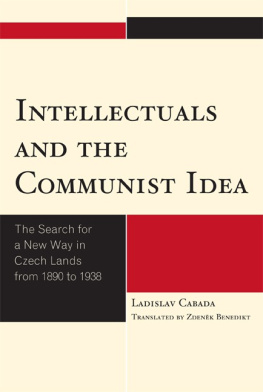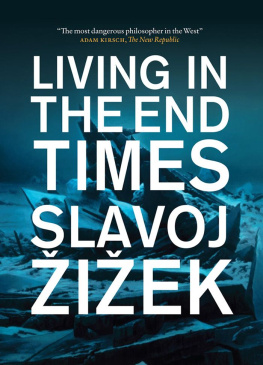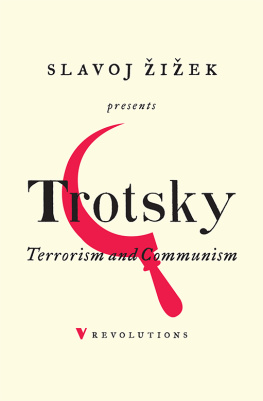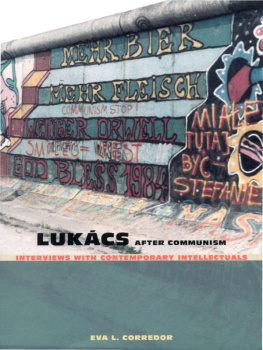THE IDEA OF COMMUNISM
VOLUME 3
The Seoul Conference

EDITED BY ALEX TAEK-GWANG LEE
AND SLAVOJ IEK

First published by Verso 2016
The collection Verso 2016
Individual contributions the contributors 2016
All rights reserved
The moral rights of the authors have been asserted
1 3 5 7 9 10 8 6 4 2
Verso
UK: 6 Meard Street, London W1F 0EG
US: 20 Jay Street, Suite 1010, Brooklyn, NY 11201
www.versobooks.com
Verso is the imprint of New Left Books
ISBN-13: 978-1-78478-394-5 (PB)
ISBN-13: 978-1-78478-393-8 (HB)
ISBN-13: 978-1-78478-396-9 (US EBK)
ISBN-13: 978-1-78478-395-2 (UK EBK)
British Library Cataloguing in Publication Data
A catalogue record for this book is available from the British Library
Library of Congress Cataloging-in-Publication Data
A catalog record for this book is available from the Library of Congress
Typeset in Cochin by Hewer Text UK Ltd, Edinburgh
Printed in the US by Maple Press
Contents
This book is a collection of speeches and interventions that were presented at the Idea of Communism Conference in Seoul, 24 September2 October 2013. The pursuit of communism has a long history throughout the Asian region. For countries like North and South Korea, Vietnam, Cambodia and China, the passage to a form of modernity is even unthinkable without this history. The struggle between communism and anti-communism still defines the regions politics. The anti-communism once employed during the Cold War era, especially in South Korea, has not yet faded away, and is still used for attacking the left in many Asian countries. In this sense, Asia is a lively location for discussing the idea of communism from a non-Western perspective and evaluating whether the idea is universal; or, instead, whether it is to be defined by its regional situation, or by its historical or temporal moment or movement(s). The idea of communism, as Alain Badiou and Slavoj iek conceive it, involves the global struggle towards absolute equality. Seoul, the capital of South Korea, was chosen as the conference venue because here the idea of communism is once again in the air, re-insinuating the excluded passion for the real into the struggle for independence, justice and rights, into the seamless reality of global capitalism. The Korean peninsula is divided into two regimes, the North being an actually existing communist country and the South, on the contrary, a highly developed capitalist country. But a conference such as this could never take place in the North, any more than in China. How should we read this apparent paradox? Here, in summary form, we have the history of communisms development: the negation of communism = anti-communism, and then the liberal negation of anti-communism (negation of the negation) = anti-anti-communism. But what of communism itself? As the authors in this collection all agree, today one should face up squarely to the legacy of anti-communism, and also to its future, and to the political and intellectual oppression of the idea of communism. Crucially, however, the alternative to such oppression is nothing so negative as anti-anti-communism in the Asian context. The contributors to this volume intervene on many issues relating to the reassessment or reaffirmation of the idea of communism in light of the various political experiments found across Asia and elsewhere.
Towards the end of September 2014, after declaring war on Islamic State, President Obama gave an interview to 60 Minutes in which he tried to explain the rules of the US engagement: When trouble comes up anywhere in the world, they dont call Beijing, they dont call Moscow. They call us. Thats always the case. America leads. We are the indispensable nation. This holds also for environmental and humanitarian disasters: When theres a typhoon in the Philippines, take a look at whos helping the Philippines deal with that situation. When theres an earthquake in Haiti, take a look at whos leading the charge helping Haiti rebuild. Thats how we roll. Thats what makes us Americans.
In mid October, however, Obama himself made a call to Tehran, sending a secret letter to Ayatollah Ali Khamenei in which he suggested a broader rapprochement between the United States and Iran based on their shared interest in combating Islamic State militants. Not only did Iran reject the offer, but when the news of the letter reached the wider public, the US Republicans denounced it as a ridiculous gesture of self-humiliation that can only strengthen Irans arrogant view of the United States as a superpower in decline. That is how the United States rolls, effectively: acting alone in a multi-centric world, they more and more accumulate wars and lose the peace, doing the dirty job for others: for China and Russia, who have their own problems with Islamists, and even for Iran the final result of the invasion of Iraq was to deliver Iraq to the political control of Iran. (The United States got caught in this process already in Afghanistan where their help to the fighters against the Soviet occupations gave birth to the Taliban.)
The ultimate source of these problems is the changed role of the United States in the global economy. An economic cycle is coming to an end, a cycle which began in the early 1970s, the time that saw the birth of what Yanis Varoufakis calls the Global Minotaur the monstrous engine that was running the world economy from the early 1980s to 2008. The late 1960s and the early 1970s were not just times of oil crisis and stagflation; Nixons decision to abandon the gold standard for the US dollar was the sign of a much more radical shift in the basic functioning of the capitalist system. By the end of the 1960s, the US economy was no longer able to continue the recycling of its surpluses to Europe and Asia: its surpluses had turned into deficits. In 1971, the US government responded to this decline with an audacious strategic move: instead of tackling the nations burgeoning deficits, it decided to do the opposite, to boost deficits. And who would pay for them? The rest of the world! How? By means of a permanent transfer of capital that rushed ceaselessly across the two great oceans to finance Americas deficits: the United States has to suck up $1 billion each day flowing in from other nations to finance its domestic consumption, and is thereby the universal Keynesian consumer that keeps the world economy running. This influx relies on a complex economic mechanism: the United States is trusted as the safe and stable centre, so that all others, from the oil-producing Arab countries to Western Europe and Japan, and now even the Chinese, invest their surplus profits in the United States. Since this trust is primarily ideological and military, not economic, the problem for the United States is how to justify its imperial role it requires a permanent state of war, in which it can offer itself as the universal protector of all other normal (not rogue) states.
However, even before it has fully established itself, this world-system based on the primacy of the US dollar as the universal currency is breaking down and is being replaced by what? This is what the ongoing tensions are about. The American century is over, and we are witnessing the gradual formation of multiple centres of global capitalism the United States, Europe, China, maybe Latin America, each of them standing for capitalism with a specific twist: the United States for neoliberal capitalism; Europe for what remains of the welfare state; China for Asian Values (authoritarian) capitalism; Latin America for populist capitalism. In this world, the old and new superpowers are testing each other, trying to impose their own version of global rules, experimenting with them through proxies which, of course, are other small nations and states.

